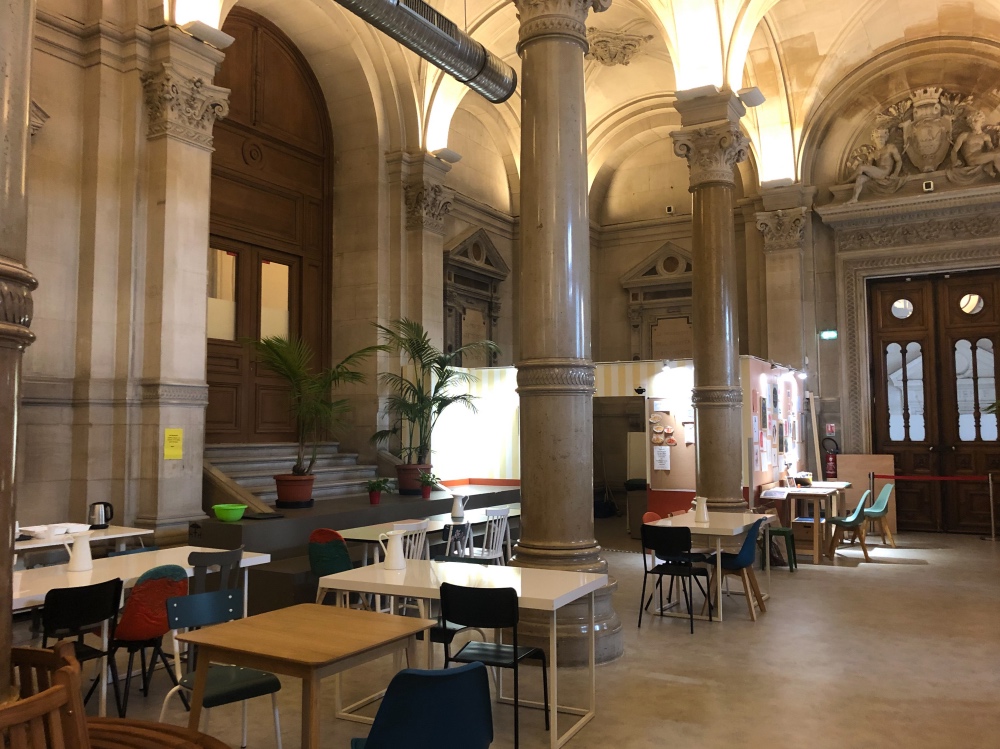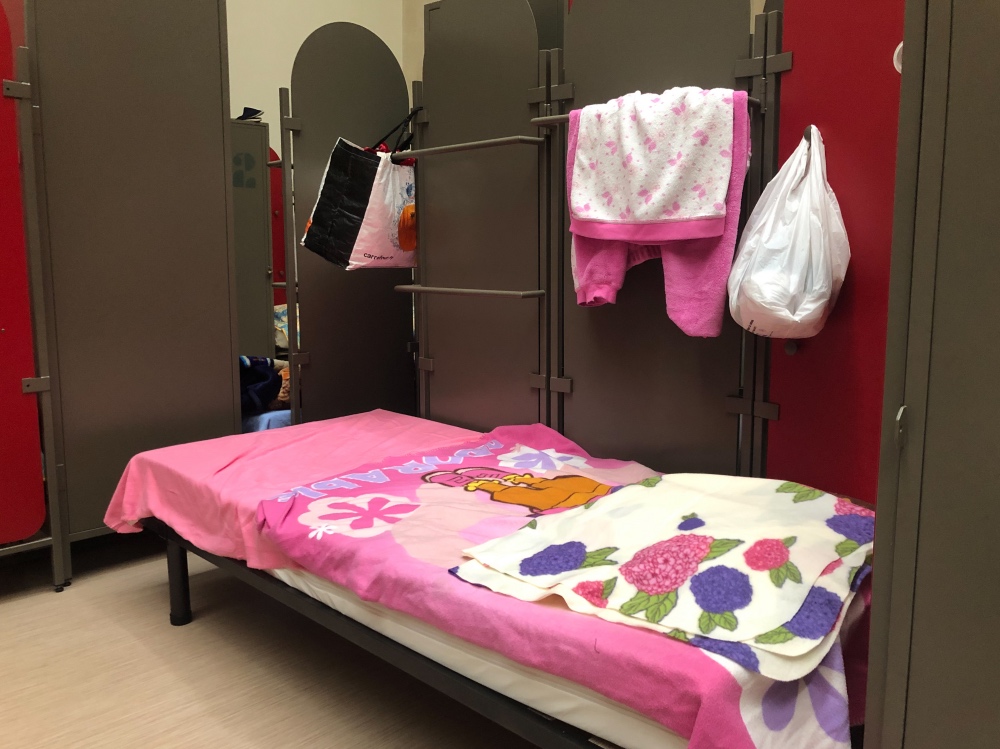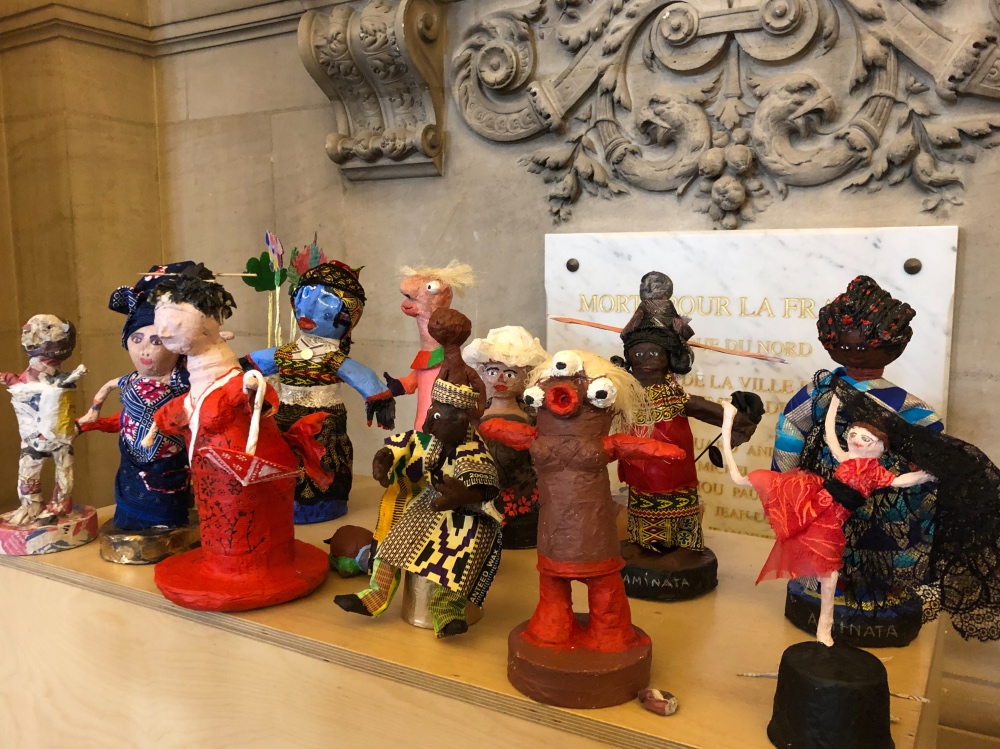
ZOE TABARY, of Thomson Reuters Foundation, reports from Paris on how the city is helping homeless women…
Paris
Thomson Reuters Foundation
Marie-Claire may not have an address but she owns a red letter box made of papier mache, which reminds her of the “home I’ll have one day”.
Along with about 120 homeless women, she has taken shelter in Paris’ palatial city hall where she gets hot meals and a bed, housing and healthcare guidance, along with arts therapy.
“When I leave here I will have a home…big or small it doesn’t matter, as long as my kids can join me,” said the mother of two, slouching in a wheelchair against a wall of bright drawings.

Entrance of the women’s shelter in the palatial city hall in Paris, France, on 12th April. PICTURE: Thomson Reuters Foundation/Zoe Tabary
France, like most European countries, has seen a rise in homelessness in the past decade, fuelled by fallout from the global financial crisis and an influx of migrants from Africa and the Middle East.
Paris alone has more than 3,600 homeless people – 12 per cent of them female – according to official estimates, an increase of about 20 per cent since 2018.
“It’s symbolic to have this refuge in such a grand venue. It’s telling homeless women: we see you, we haven’t forgotten about you.”
– Francoise Khenfer of the Samusocial de Paris.
In October, it announced plans to house some of the city’s homeless in its sumptuous city hall, built in chateau style with turrets, gilded ballrooms, ornate stonework and statues.
Only women were admitted under the mayoral initiative, part of a broader scheme to get people off the streets over winter.
Homelessness is worse for women, many of whom hide in parking lots and waiting rooms to escape a daily diet of harassment and violence, said Francoise Khenfer of the Samusocial de Paris, a government-funded charity that runs emergency services for the homeless.
She runs one of the city’s four emergency shelters for homeless women – hers alone, though, is situated in a landmark building, famed for its opulent Renaissance style and its historic associations in a prime downtown location.
Opened at the end of 2018, the city hall shelter is the size of three tennis courts and the women live, sleep and eat in two grand salons on the western flank, with the rest of the building given over to office work and official events.
It provides shelter to some 50 women by night and another 75 during the day, giving them a visibility they had lacked and referring them to the health and social workers they need.
“It’s symbolic to have this refuge in such a grand venue,” said Khenfer, framed by the marble pillars of the entrance and fringed by palm tree plants.
“It’s telling homeless women: we see you, we haven’t forgotten about you.”

A bed and belongings in the women’s shelter city hall in Paris, France. PICTURE: Thomson Reuters Foundation/Zoe Tabary
In the past decade, the number of women requesting emergency shelter in France has risen by two-thirds, said Samuel Coppens, spokesman for the Fondation de l’Armee du Salut, the French chapter of the Salvation Army charity.
Although homeless women are nothing new, many cities are poorly equipped to support them and only offer mixed-sex shelters where violence and theft are rife, said Khenfer.
“Ninety-nine per cent of women here have suffered violence – whether at the hands of their husband or of smugglers,” she explained, in reference to rampant people smuggling into Europe.
But very few of them will go on to press charges, she said. “They’re either terrified of the repercussions, or have no way of tracking down their assailant.”
“Ninety-nine per cent of women here have suffered violence – whether at the hands of their husband or of smugglers.”
– Francoise Khenfer.
Add to that the “invisibility techniques” used by many homeless women to protect themselves and their children and it becomes “extremely difficult” to provide adequate health and social support, said Coppens.
Marie-Claire, who declined to give her surname for safety reasons, fled to Europe in 2016 after her husband injured her knee in her native Cameroon.
“He had hit me before but never so bad,” she whispered, adding that her biggest regret was leaving her two daughters behind as “the trip was too dangerous”.
After sleeping in hospital waiting rooms for nearly a month, a social worker directed her to the city hall shelter, where she has applied for a residence permit and is awaiting knee surgery.
“Staying here is much better than in hospital, you’re guaranteed three meals a day and I feel safe,” she said, wrapping a large red scarf around her shoulders.
From a tiptoeing ballerina wearing a black lace veil to a faceless figure stretching her arms open, a dozen papier mache dolls are displayed on a wooden table.

Papier marche dolls from an arts therapy class at the women’s shelter in Paris city hall, France, on 12th April. PICTURE: Thomson Reuters Foundation/Zoe Tabary
Dubbed “the little women of city hall”, they were built and painted by the shelter’s residents in arts therapy classes.
“Our teacher said we can make the dolls however we like, as long as they are standing,” said one woman called Leila, her smile revealing two broken teeth.
Although art is no substitute for a home or financial aid, it can help women heal after psychological trauma and “take their mind off their pain and worries”, said Khenfer.
“A woman sleeping on the street does not have the luxury to think about the future,” said Khenfer. “She’s just worried about where she’ll be the next day.”
“But give them a sense of routine or a task like art, which they control, and they start seeing a way out.”
Marie-Claire, who opted to build a letter box over a doll, said the workshops had made her want to open up.
“We’re like a family here,” she said, under the salon’s crystal chandelier. “Even if I leave [the shelter] for a few hours, the women call me to know where I am.”
The shelter has no plans to close, said Khenfer, although the decision hinged on “continued funding”.
She said that while the city hall shelter had “proved extremely popular, Paris needs way more women-only shelters”.
“Otherwise homeless women will keep hiding in buses, hospitals, parking lots, and we won’t be able to help them.”





